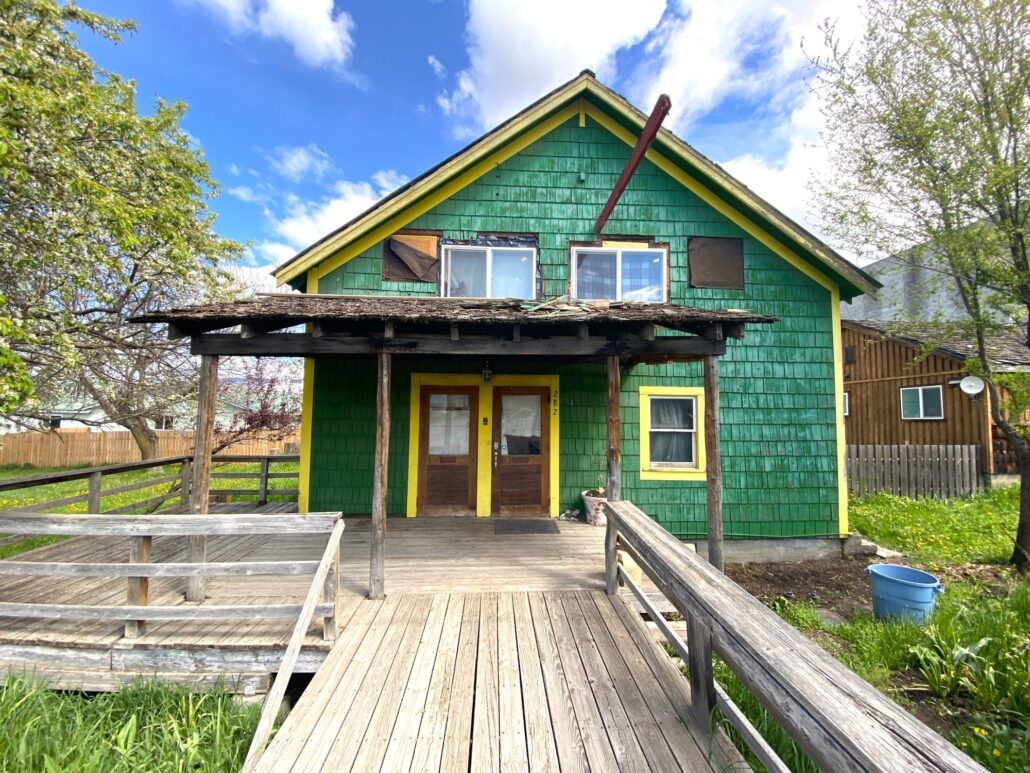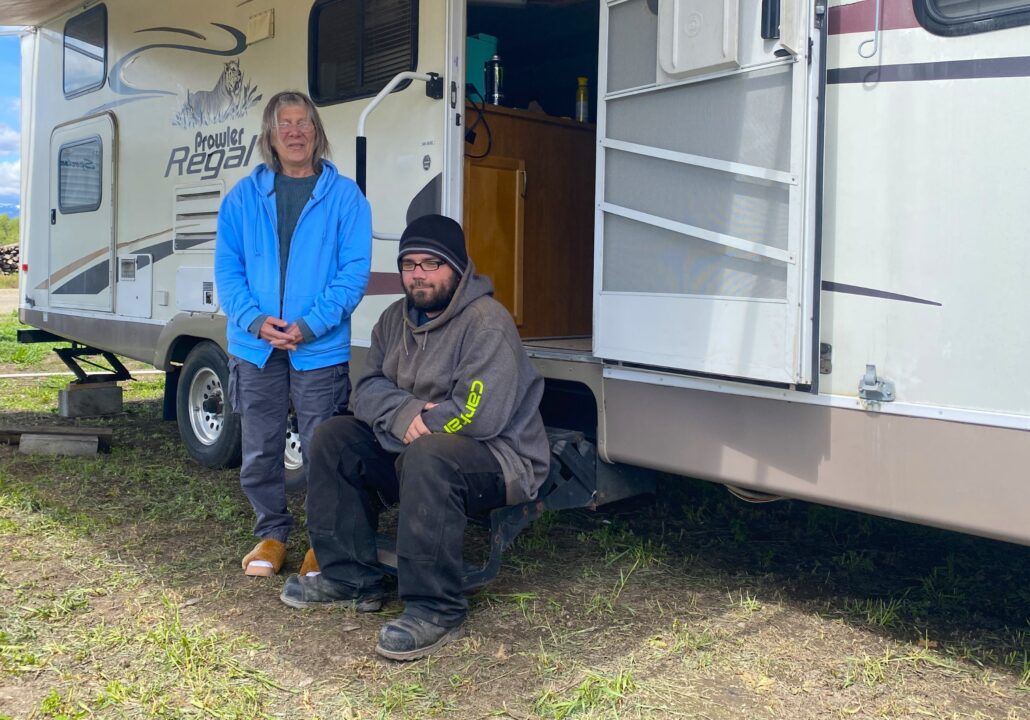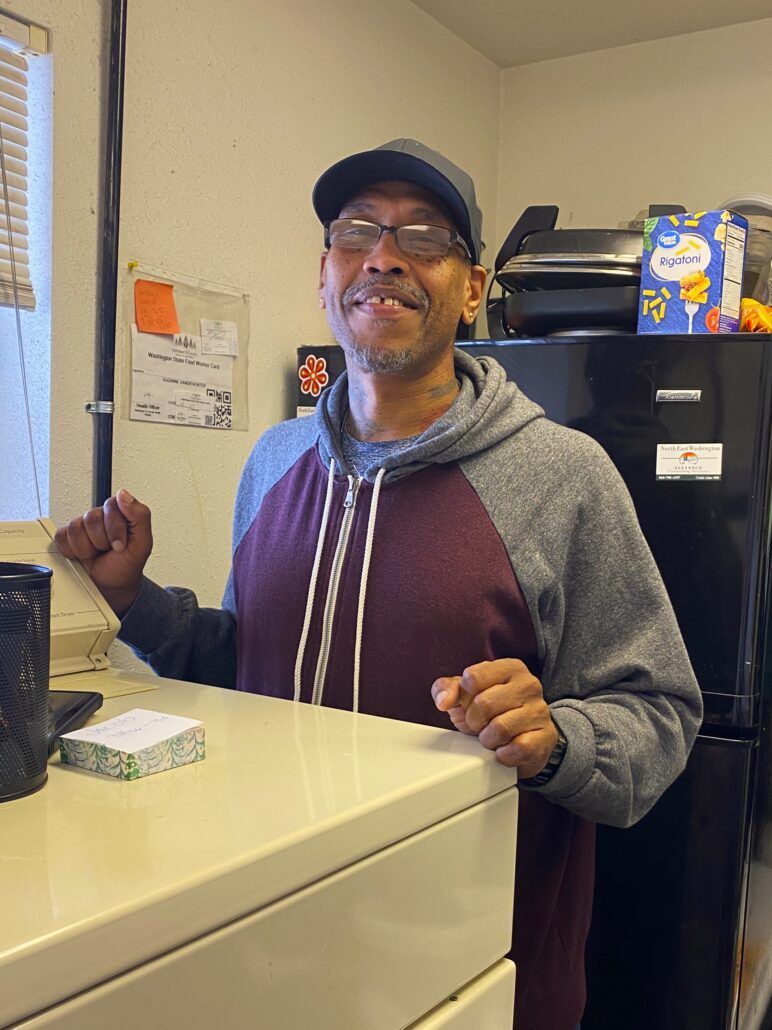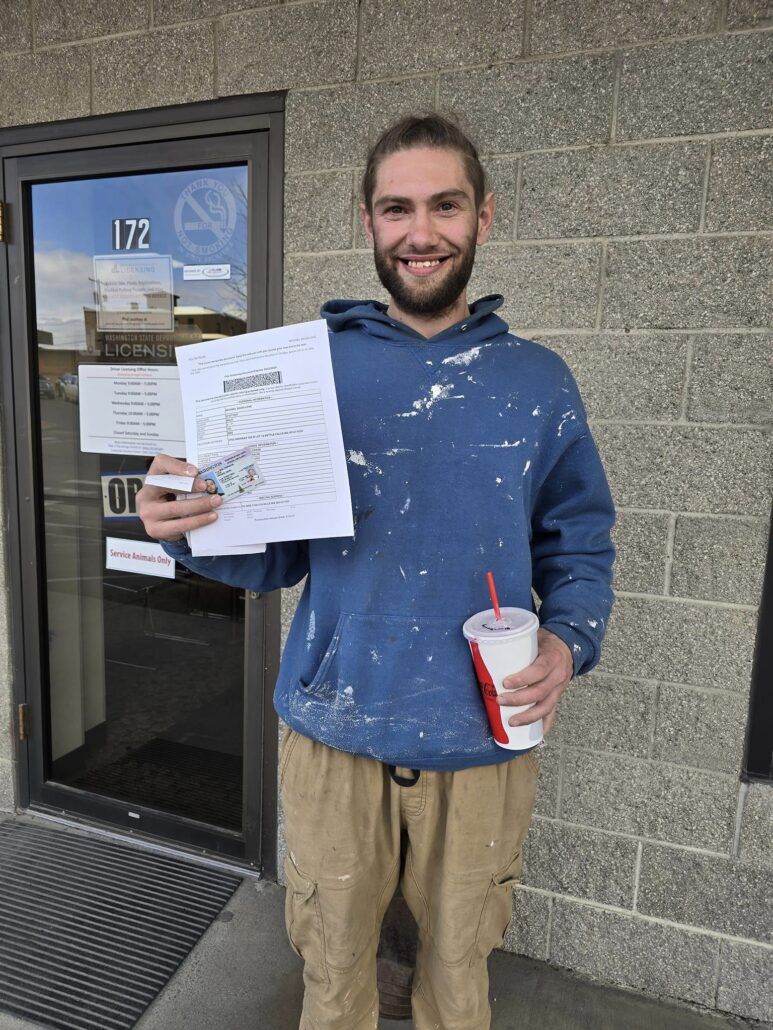Adventist couple tackles homelessness with compassion in rural Washington town
News Story by Cassy Benefield | FāVS News
“We wanted to move to a small town so we could be part of the community and be helpful. We had no idea.”
Shelley Bacon
COLVILLE, WA – When Shelley and Dr. Barry Bacon see someone homeless in their small town of Colville, they perceive a son or daughter of God.
They see an individual with a serious health disparity that can begin to heal with a roof over their head and a safe place to rest.
“People who are living without shelter live on average 17 years less than people who are in shelter,” said Barry Bacon, who co-founded Hope Street Project in 2015 with his wife Shelley Bacon. “You have to talk about housing.”
According to Apartments.com, the average rent in Colville is $477 for a one-bedroom and $678 for a two-bedroom as of May 2024. However, a search on Zillow.com shows only two apartments available for rent in Colville, neither of which aligns with those prices. The Highlands Apartments, for seniors or disabled, rents one-bedrooms for $974/month, some with rental subsidies for those who qualify. The Colville Park Apartments advertise a one-bedroom for $768/month, but their voicemail indicates they are currently full with a waitlist.
One of the project’s goals is to help increase affordable housing, among other initiatives. So far, it hosts three small rentals and one rental home for the previously homeless. They are currently raising money for Patrick’s Place for people ready to transition out of homelessness.
‘I can’t stand to live my life that way’
Barry Bacon, a medical doctor by trade, is a driven, soft-spoken, “closet type-A” with a great sense of humor, according to his wife. He runs the Heartland Medicine Colville Clinic and assists with medical missions in Africa. He said he cannot see a need he can fill and not do anything about it.
“The thing that I can’t stand is when you see a disparity, you see human suffering, and you stand by and let it happen when you have the power to do something about it,” Barry Bacon said. “I can’t stand to live my life that way.”
When he met Cherie Moore and her adult son, Cody Barnes, he knew immediately he wanted to “do something about it,” he said.
“We didn’t know her story but I could see that she was highly vulnerable,” Barry Bacon said.
When they first met, Moore could not clearly communicate with him.
He invited them to stay in what he and his wife call the Green House, where they currently host Saturday night Bible studies and offer some homeless a shelter, when the accommodations work out.

Plans are to eventually turn the building into a faith-based, live-in recovery residence for men called “Bridges for Hope.” Currently, there are rooms with mattresses and beds and doors that lock, providing guests with safety and comfort.
The city’s homeless camp, which the Bacons criticize for its subhuman conditions of lack of potable water, sewer and electricity, Barry Bacon said, has caused controversy in the community. Barry Bacon also said it is extremely dangerous, especially to women.
And Moore did not escape that danger, her son told Barry Bacon.
A ‘hand up’ not a ‘hand out’
Moore and her son, Barnes, moved to Colville to escape their troubles on the west side of the state. Barnes had experienced a traumatic event at work, exacerbating his already severe anxiety, that put him in his room for two years.
“I’m sitting there watching him die in his room,” she said.
They planned to find an affordable rental in Colville, living off her son’s disability and Moore’s retirement income. However, when their funds ran out paying for a hotel, they became homeless again — a recurring situation for the past 21 years.
Two days after they were sheltered in the Green House, Moore began speaking and dreaming again. Not doing so, Barry Bacon explained, was the physiological toll that comes with being homeless.
A few months later, with Shelley Bacon’s help and her connections, Moore was able to borrow some money to buy a fifth-wheel trailer and set it up at Highland Creek RV Park.

The park’s manager, Kenny Beasley, said it’s the only low-income housing option in the county, offering utilities and trailer spots at very little cost, with plans to expand.
Moore said she is grateful to the Bacons for giving her and her son a much-needed “hand up,” not just a “handout.”
Colville’s housing crisis
Colville has not had much housing on offer for families like Moore and her son for the last five years.
In 2020, Catholic Charities of Eastern Washington (CCEW) commissioned a study that found vacancy levels at or below 1%, discovering 1,841 households eligible for subsidized affordable housing, 76 households experiencing homelessness and 12 chronically homeless households.
According to city planning records, from 2019 through 2023 Colville netted 15 new residences, factoring in demolitions and new builds.
Meeting this need, CCEW planned to complete a 71-unit apartment complex called Colville Family Haven (CFH) by December 2024. However, CCEW just received their permits to build on May 20.
“Our start date was impacted by the need to allow time for the community to consider updates to its comprehensive plan and to secure a special use permit,” said Johnathan Mallahan, CCEW chief housing officer.
Construction on CFH is now slated to begin in June and finish in fall 2025.
Colville’s rise in homelessness
Since that study, Colville’s homeless population has risen. Just how many there are varies depending on who one asks.
The city began operating a homeless camp Oct. 27, 2022, and since then through 2023, Holly Pannell, Colville’s city clerk, said they have served 136 homeless. Rural Resources Community Action, a non-profit that runs a couple homeless shelters in Colville, reported they helped 96 homeless — 66 adults and 30 children — in 2023.
And Rural Resources’ latest point-in-time count on Jan. 25 records 29 unsheltered and 34 sheltered individuals.
Barry Bacon estimated his team served about 250 homeless in 2023, largely through Hope Street Rest Stop, which they launched in 2019.
‘It’s not the oncoming train’
The Rest Stop is a day facility run by Director Teresa Lang for the homeless to take care of things they can’t usually do without a home. They provide resources including daily hot meals, a place to shower and do laundry, toiletries and food donations and assistance to fill out needed paperwork.
Lang loves her job because she’s been where many of the people she helps have. She said “by the grace of God and prayer and me working it,” she has been clean and sober for almost 21 years.
“But I had to get serious. I had to want it,” Lang said. “And now I show up for people because I let them know that there’s light at the end of the tunnel and it’s not the oncoming train.”
One of the people she showed up for was 55-year-old Richard Smith.
Just wanting to be in the mountains alone
Like Moore and her son, his story also started on the west side of the state. He worked and made good money, but not enough to live in an apartment on his own. So, he started living in his truck. Then, he said he got fed up with people and wanted a change.
“I got discouraged with life, in humans and just how evil people can be to other people,” Smith said. “I just wanted to be in the mountains alone.”
He wound up in Colville in winter, not expecting the cold, he said. Eventually, Smith found out about the Rest Stop and cooked his meals there while he stayed at Colville Community Warming Shelter.
He also prayed to find a Bible study or a church and to meet true people who didn’t want anything from him, who just wanted to help, he said. That answer came soon after he heard Barry Bacon’s voice calling out about a Bible study. At the time, Smith had no idea his connection with Lang and the Rest Stop or that he was a doctor.
Smith soon hit it off with the Bacons through the Bible study, and he began to stay in the Green House. He also worked closely with the Bacons and Lang on whatever projects they needed done.
Smith’s health crisis
One morning, as Smith prepared to work with the Bacons on a job, he started feeling chest pains and had a friend call an ambulance. At the hospital, the Bacons were by Smith’s side.
Barry Bacon noticed that something beyond a heart attack may be happening to Smith. After he didn’t feel a pulse in Smith’s leg, he suspected an aortic dissection instead, which has a 75% fatality rate and is more dangerous than a heart attack.

After tests confirmed his suspicion, Smith was airlifted to Sacred Heart in Spokane, saving his life. Before discharge, Barry Bacon offered Smith to recover either at the Bacons’ home for closer care or the nearby cabin to avoid stairs, concerned about Smith’s mobility after his ordeal.
Smith chose the cabin, which needed a lot of work done. So, before Smith came home, the Bacons invited about 18 students from the Seventh-day Adventist Church Upper Columbia Academy to help them get Smith’s home ready.
“I have never met people like that, never, that just love you for you,” Smith said speaking about the Bacons.
Hope Street Restoration
Before his heart incident, Smith was about to head out to work at Hope Street Restoration, which is the most recent iteration of the Bacons’ helping hand in Colville. Launched in 2021, this for-profit real estate business restores not only homes, but dignity to those neglected by homelessness by giving them jobs, job-training and leadership opportunities, according to its website.
Shelley Bacon, Restoration’s co-founder, CEO and forewoman hires all her employees. She usually gets recommendations from Lang at the Rest Stop. Someone will come up to Lang and say, hey I’m clean and sober and I need a job, Lang said. That’s when Shelley will meet them and have them fill out an application.
Creating the spark to get things done
An educator by profession, Shelley Bacon is passionate, her husband said, and able to see a space and make it beautiful. She calls herself a spark person. She can find a way to light the spark that gets a job done or a need met, either by herself or through people she knows, she said.
With her tool belt on, a bit of drywall dust in her hair and paint on her clothes, Shelley Bacon gives her employees the rules — do not curse on the job, create a respectful workplace, show up on time ready to work, submit to drug tests when asked, work safely, etc. So far, she has hired 26 people, mostly men but a couple of women, too.
“The shortest tenure was one day. The longest was 1.5 years. The average would be around four to six months, I would say,” Shelley Bacon said.
Those who stick around are taught new skills, such as crown molding. Once they learn the skill to her satisfaction, she leaves them on their own to finish, which gives them a sense of ownership and pride over a job well done. Some of the men she works with have needed to go back to treatment more than once. Some come back, some don’t.
From drug court and homelessness to a fifth-wheel trailer and a job
One person she’s helped along his path is 30-year-old Michael Love. He came up to Colville to ride out a one-year sentence in drug court. While serving his sentence, he could not use anything drug-related, including alcohol and marijuana. However, Love recently got caught smoking marijuana and was sent back for his third time in a drug treatment program. He was interviewed while there.
“Every time I’ve come back (from treatment), it’s just a little step toward being an adult and just, like, being out there on my own,” Love said. “It’s really not even about the drugs for me anymore. It’s just another step towards being done with drug court and just having to do what I have to do for the system.”
The difference between getting out this time from the other two will be he’s coming back to a home and a vehicle, largely due to Shelley Bacon. She uses a small fund, kind of like a credit card for those in need, where she loans people money. From this revolving fund, she loaned Love the money to buy a fifth-wheel, which he’s paying her back for.
Feels good to be ‘legit’
Love’s story began as a teenager, when he and his girlfriend got pregnant. That didn’t work out, and since then he’s been to jail, he’s been an addict to hard drugs while fathering two children. Throughout it all, he’s been in and out of homelessness.
When Shelley Bacon hired Love last November, he was homeless and planned to file for disability. In time, Love said she helped him learn new skills and encouraged wiser life choices. Getting a driver’s license was a big one. He had been driving since he was a teenager, but unlicensed. On Hope Street Restoration’s Facebook page, Shelley Bacon called the day he stepped out of the DMV with his license her payday.
“Today was payday for me. No, I didn’t get any money. I got something far better: the pure joy of seeing Michael Love get his driver’s license for the first time!” Shelley Bacon wrote. “I am so proud I could cry.”
She commented on how far he had come from thinking he would just file for disability.
“Today, he is making payments on his own fifth wheel and has an address to use for his driver’s license. He had a hard time containing his own excitement,” she said. “His whole thinking is changing. His outlook for his future is completely different now.”
Love said it felt good to be legit.
“She’s been a great help and just wants me to do it all legitimately, not getting in trouble at all anymore,” he said. “And I’m down with that. … Just trying to do good for myself and for my son and everybody else around me.”
‘Hope Street Exposed‘
Not everyone in the community has been thrilled with the Bacons and what they are doing for the homeless. Some even spread false information, Barry Bacon said.
In their most recent newsletter, the Bacons started it by debunking “bizarre accusations” about what they are doing. These include busing illegal immigrants, rumors of getting rich from helping the poor and completing a hostile takeover of the city by buying up buildings. The Bacons and Lang also created Facebook video, “Hope Street Exposed,” to respond to these claims.
Lang also said businesses around the Rest Stop have complained about the homeless gathering around their property and the garbage they leave.
Local businesses complain
Joseph Aubert, co-owner of Subaru Guru, less than 200 feet down the street from the Rest Stop, is one of those business owners.
“We have no problem helping those in need, especially those that are trying to help themselves,” Aubert said, noting he believes the intentions of the Bacons and their team are good. “But what we see on an everyday basis from this particular facility, our interpretation is it’s more so enabling, as opposed to helping the problem.”
While Aubert said he hasn’t lost business over the problems he experiences with the homeless, the inconveniences have cost him time. He has had to deal with picking up the trash they leave on his property, the threats from the homeless when he asks them to clean up after themselves, some of their open drug use on his property and his customers’ discomfort with dropping off their cars for repair.
Having to add fences and upgrade security have cost him money, he said.
“I think that business owners feel that the will of Hope Street is being forced onto us. We feel like we’re having to work around it,” he said. “We’re the ones who are experiencing the cost of such a thing. While the ones who are running it are not.”
The Bacons note these issues as well, but believe they can’t just stand by and do nothing, they said.
‘Why we do what we do’
The Bacons said Jesus is the reason why they do what they do. Barry Bacon read John 17:3 as his favorite passage to show the reason why he does what he does for others. “Now this is eternal life: that they know you, the only true God, and Jesus Christ, whom you have sent.”
“So, that’s the essence of why we do what we do,” Barry Bacon said. “I want to experience him personally. So it’s a faith experience. It’s a walk with God.”
Shelley Bacon’s favorite verse and her why has a different thrust. She read Ephesians 5:1-2 from the Message:
“Watch what God does, and then you do it, like children who learn proper behavior from their parents. Mostly what God does is love you. Keep company with him and learn a life of love. Observe how Christ loved us. His love was not cautious but extravagant. He didn’t love in order to get something from us but to give everything of himself to us. Love like that.”
To illustrate, she shared a story about a man she and her husband were helping who asked her one day why she helped him.
Shelley Bacon answered, “Well, here’s why. God loves me and I get to love you. End of story.”
UPDATE: Corrected the year Hope Street Rest Stop began and the name of the warming center Richard Smith stayed in when he first came to Colville, Washington.












Lovely story, Cassy; it obviously took a ton of work to do. And it’s in a part of the state most of us don’t get to. Am positive one of the national Adventist publications – the Spectrum or the Adventist Review would want to reprint your story. Do consider emailing it to Justin Kim at manuscripts@adventistreview.org.
Thank you Julia! That means a lot. And I will email Justin! Thanks for the tip!
I’ve heard about this couple for a few years now – glad to read about them here, thanks Cassy
Thanks, Jonas!
Great job writing/reporting this story. I see a two-fold opportunity here: an opportunity to minister to the homeless AND an opportunity/responsibility to love and protect the neighbors who are impacted by the actions of some of the unhoused persons involved with Hope Street. Both actions are important.